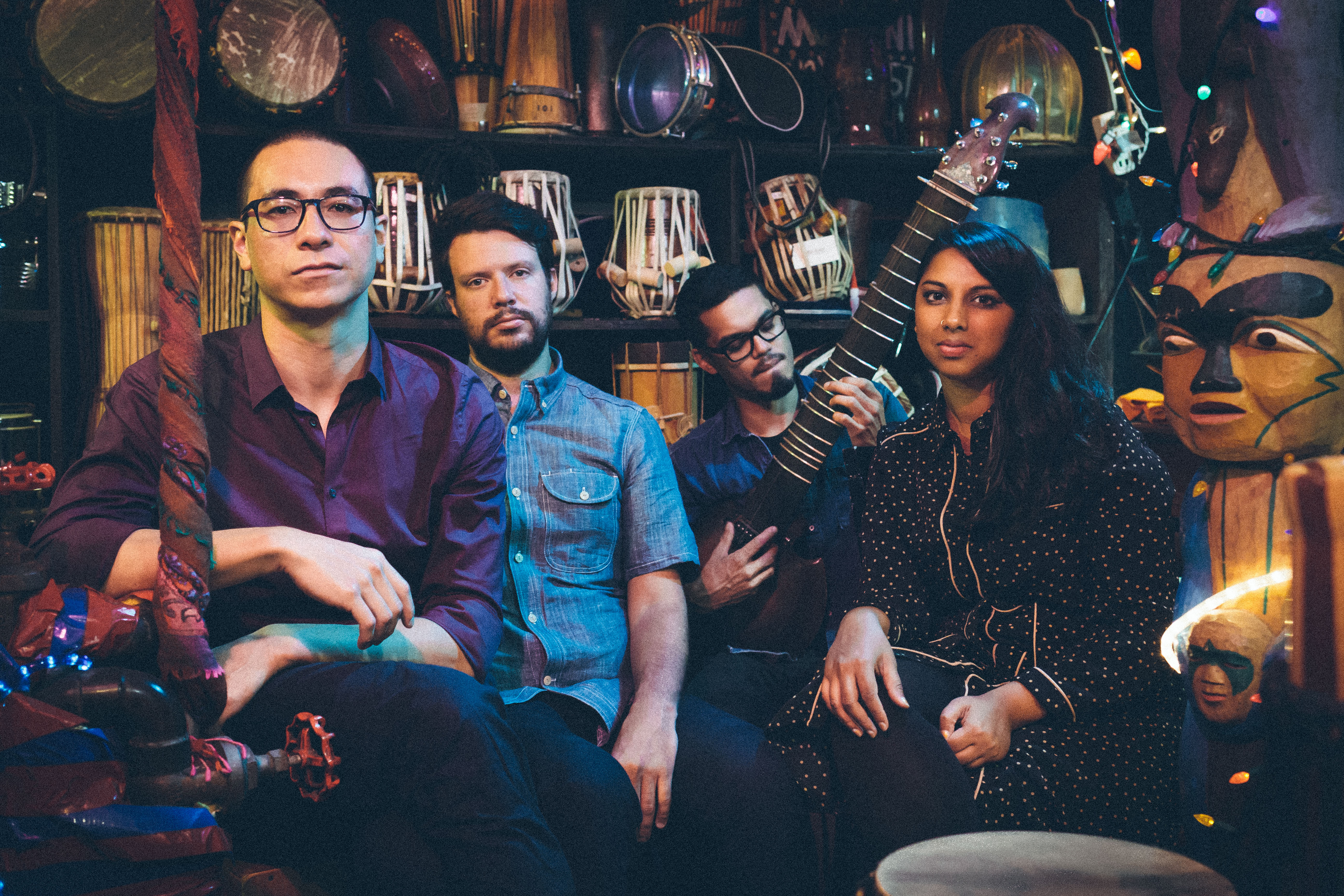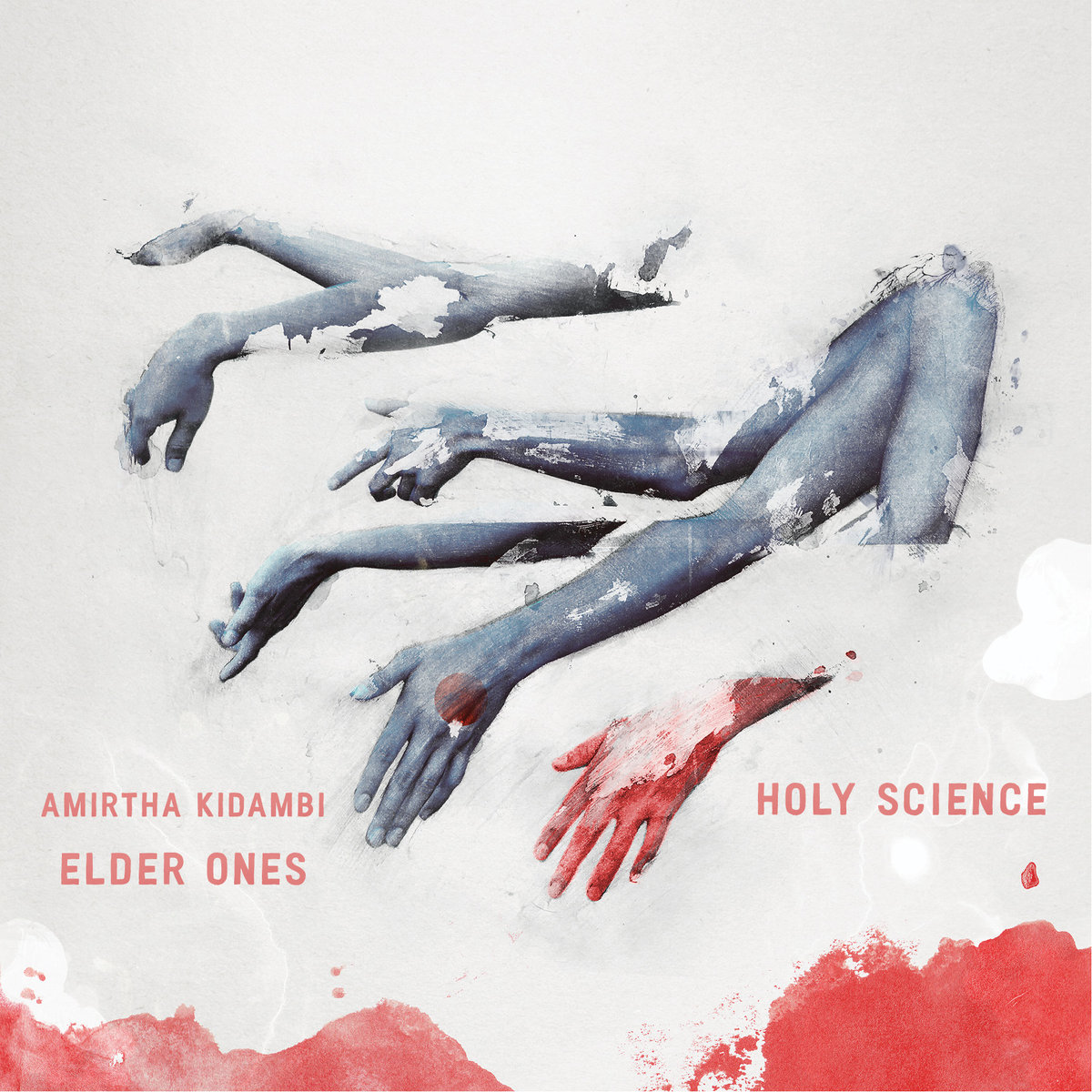Amirtha Kidambi is on the cutting edge of a wide range of music that includes free improvisation and jazz, experimental music, and new music. She is a soloist, collaborator, and ensemble member in a number of groups including the early music-inspired dark folk band Seaven Teares, Mary Halvorson‘s newest quintet Code Girl, analog percussion and light ensemble Ashcan Orchestra, and Darius Jones’ vocal quartet Elizabeth-Caroline Unit. As an improviser, she has played with Matana Roberts, Tyshawn Sorey, Daniel Carter, Darius Jones, Peter Evans, Trevor Dunn, and many other innovators on the New York scene. Past projects and upcoming collaborations include the premiere of AACM founder and composer/pianist Muhal Richard Abrams’ Dialogue Social, Darius Jones’ The Oversoul Manual at Carnegie Hall, a premiere of electronic composer Ben Vida’s work Slipping Control for voice and electronics with Tyondai Braxton at the Borderline Festival in Athens, Greece, the premiere of the late Robert Ashley’s final opera CRASH at the Whitney Biennial, and many highly-praised performances in New York and beyond. Amirtha is 2016-2017 Asian Cultural Council Fellow, and will travel to India for intensive study in Carnatic vocal music in the Summer of 2017.
Amirtha will be presenting music by her band Elder Ones at Winter Jazz Fest, January 7, 8 pm, at the New School Glass Box Theater. The band’s debut record, Holy Science, was just released on Northern Spy Records in November.
Interview
Cisco Bradley: What are you expressing with Elder Ones?
Amirtha Kidambi: I would say Elder Ones is, at this point, the most complete expression of my creative self. I’ve spent many years performing the work of other composers and bandleaders. While I really value all of that artistic work as a performer and a collaborator, I have always felt inhibited in executing someone else’s vision. I’ve absorbed a lot from my inspiring collaborations, like the Elizabeth-Caroline Unit project with Darius Jones, Seaven Teares with Charlie Looker, the work of Robert Ashley, and so many others. I think everything I learned from my collaborations is somewhere in this music. This band really draws upon all my experiences as a performer, my formal training as a Classical singer, my background in Hindu devotional bhajan singing with the harmonium, the Carnatic music I listened to growing up, the black metal, free jazz, everything. The music is really WEIRD, and at the same time really natural for me. In terms of what the music itself expresses…it’s decidedly abstract. I’m a singer and I’m not writing lyrics. That choice was extremely liberating for me. In that way I’m not tied to any particular narrative, and the music can express and react to the moment. Reaction in terms of the real time act of improvising, but also react to a moment in our lives or a moment in time. We were on tour on election day, and the days after on tour were an insane catharsis. Using wordless syllables means that I can remake meaning each time I sing. When we were in Pittsburgh the day after the election, it was funereal grief, we were literally crying on stage. By the time we got back to Brooklyn it was rage, intense anger. The third piece in the suite is dedicated to Eric Garner, so that piece is consistently explosive, and unfortunately it continues to be reignited by new injustices each time we perform it.
CB: What was your vision for Elder Ones as a band and how has that evolved over the past few year? What specifically about the musicianship of Matt Nelson, Brandon Lopez, and Max Jaffe work so well with Elder Ones?
AK: When I started writing the music, it was for solo sets for voice and harmonium. I was having these ideas for pieces, with big open structures for improvising, and singing over bass lines on the harmonium, and the only practical way I could execute them was on my own. I really wanted to put together a band for the music, but I felt like I just couldn’t do that until I could pay people. In 2014, I got the Emerging Artist Commission from Roulette, so it was really incredible timing. The group started as a trio with Brandon Lopez and Max Jaffe. I had played free with Brandon a lot, and I really valued his audacity as a player and his individuality. He has such a strong vocabulary on the bass, and he isn’t afraid to take risks. He’s a liberated bass player, and even though he definitely “holds it down” in this band, I wrote the music in a way that gives everyone space to do their thing. Brandon definitely does! Max is literally one of the first drummers I heard in New York. We completely randomly met, as he was my Craigslist roommate’s drummer in her band at The New School, and he left a huge impression on me. Every time I saw him play, he just destroyed whatever he was playing. He’s unbelievably versatile and can play tight rhythmic material, grooves, and play free seamlessly. I knew I wanted soprano saxophone in the band specifically, to compliment the reed sounds of the harmonium and harmonize with my voice. It’s like the bass fills out the low end of the harmonium, and the soprano fills out the top. I was having so much trouble thinking of players that I loved on soprano, that I thought I should just as a great player if they were willing to try soprano. I love Matt’s playing and his language on the saxophone. I had seen him play his solo set, and play in Battle Trance and with Peter Evans, and he really struck me. His playing is visceral, which is really important for the intensity of this band. I was psyched when he said he was excited to play soprano in this band.
CB: What are your primary artistic influences?
AK: The two greatest deities in my pantheon of artistic inspiration are John and Alice Coltrane. I have been obsessed with John Coltrane since I was young, and was drawn to the beautiful subtle influence of Indian and non-Western music in his playing, the unbridled intensity and ecstatic nature, and the intense vulnerability of his self-investigation through the horn. So many of my main influences in improvised music are horn players, and I always wanted to make my voice do what a horn can do. I’m trying to do that in this band. Since the voice actually can’t do all the things a saxophone can do, I end up doing things that are not necessarily traditionally vocal, but are still natural on the instrument. Alice Coltrane’s music is inspiring for me, because it combines so many elements from so much music, without it being some contrived fusion. She incorporates her background in gospel and blues, she was a great bebop pianist, she brings in non-Western instrumentation, LA studio musicians playing Stravinsky, Indian devotional music, everything. What I love about her, is that her music is a complete manifestation of herself. Her music embodies the spiritual universalism that she believed in. That’s what I want to do. I actually grew up in the same pantheistic spiritual tradition that Alice devoted her life to, and sang the same songs that are on her bhajan records, so that makes her music feel even more personal to me. There are many different aesthetic influences in the music, but John and Alice are the major philosophical influences for me, and I share their core values.
CB: Has the fusing of improvised music and Carnatic music always been an organic and seamless process for you? What challenges have you encountered and what opportunities does this union make possible?
AK: I don’t consciously “fuse” Carnatic music with improvised music. For one thing, Carnatic music is an improvising tradition. I was never formally trained in Carnatic music, but I was heavily exposed to it my entire life, and I’m studying it now. The drones, microtonality, ragas, and rhythmic language have definitely seeped into my music, but it’s not so much a conscious effort. Even studying it now, I don’t have plans to apply specific Carnatic concepts to the music necessarily, but if what I learn impacts my improvising and writing, then that’s great! I know my formal training in Classical music, and singing the works of avant-garde composers impacts my writing and singing, so does playing in rock bands, my love for weird vamps, it’s all in there.
CB: What great vocalists have you looked to for inspiration?
AK: The voice is weird because it’s so so so individual. It’s really unlike any other instrument in that way. One of my primary aims was to find my own voice, and you can’t really look to anyone else to do that, since your instrument just can’t sound like anyone else’s. It contains your entire personality, your memories, your trauma, your insecurities. There are of course voices and singers that I love. I absolutely love Nina Simone’s voice, Sarah Vaughn as an improviser, Bessie Smith’s expression. I grew up listening to tons of Bjork and Kate Bush. I think Carnatic singing is some of the most insanely virtuosic vocal music in the world, and was raised on Sudha Ragunathan and M.S. Subbalakshmi. I was really inspired by improvising vocalists Linda Sharrock, Patty Waters, Asha Puthli, Jeanne Lee, and also my incredible colleagues here in the New York Scene, Fay Victor, Emilie Lesbros, Kristin Slipp, Jean-Carla Rodea, Anais Maviel, Judith Berkson. I think it’s a really amazing moment right now in New York that there are so many great improvising singers here.
CB: You are one of the featured performers at Winter Jazz Festival in January 2017. What music will you be presenting?
AK: We’ll be playing selections from the suite ‘Holy Science’, which is four movements titled for the four Yugas (eons in the cosmic time cycle from Hindu mythology). I. Sathya Yuga, II. Treta Yuga III. Dvapara-Yuga (For Eric Garner) IV. Kali Yuga. Kali Yuga is thought to be our current time cycle, which is one of tumult and chaos. We may also play a new piece that is in our rotation, as I’m writing more material. I’m excited that Winter Jazz Fest has a social justice theme this year, and I’m hoping there are some opportunities for action and dialogue outside of playing.
–Cisco Bradley, December 7, 2016



1 comment
Join the conversationAmirtha Kidambi Interview – Avant Music News - December 8, 2016
[…] Source: JAZZ RIGHT NOW. […]
Comments are closed.